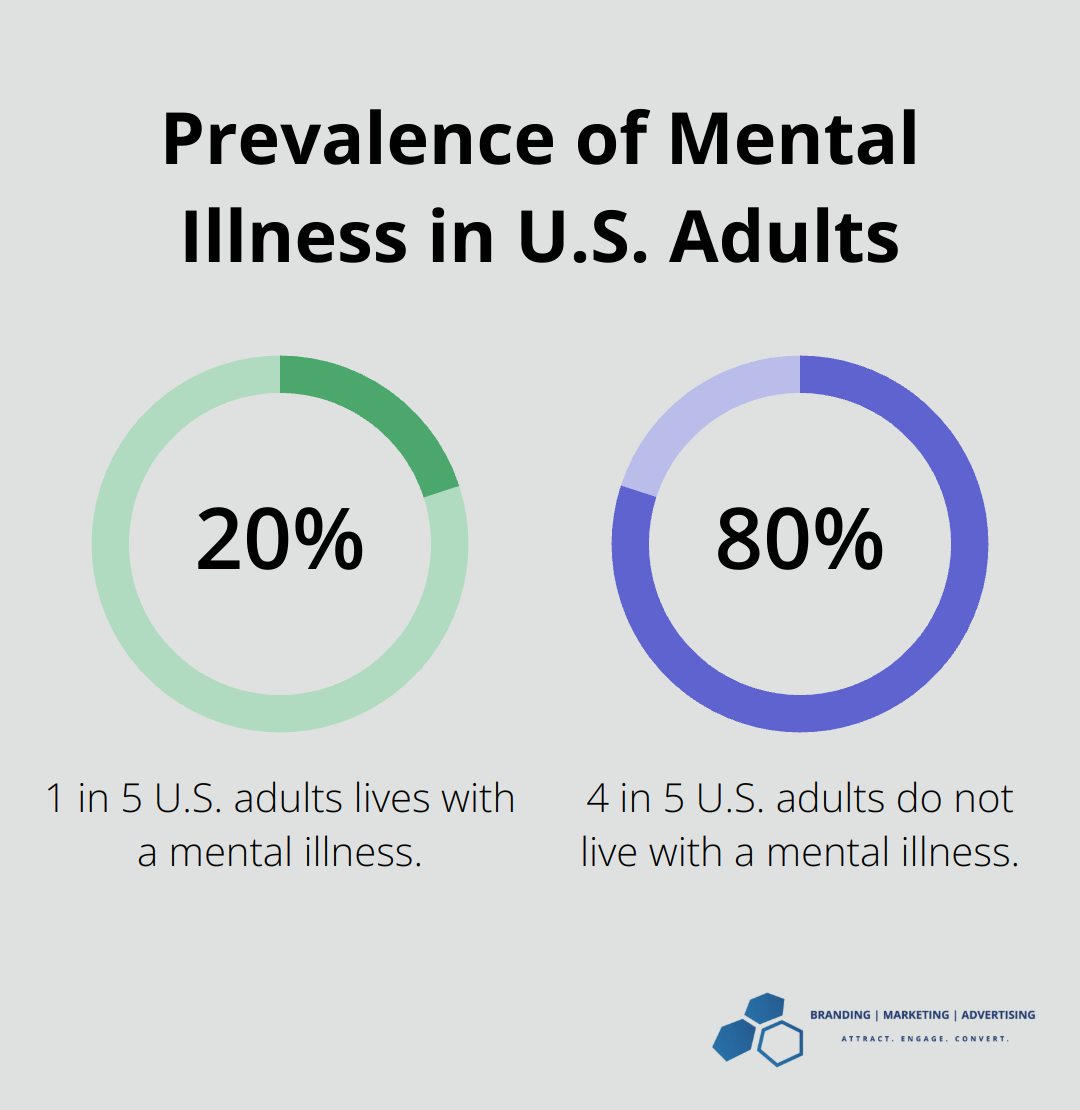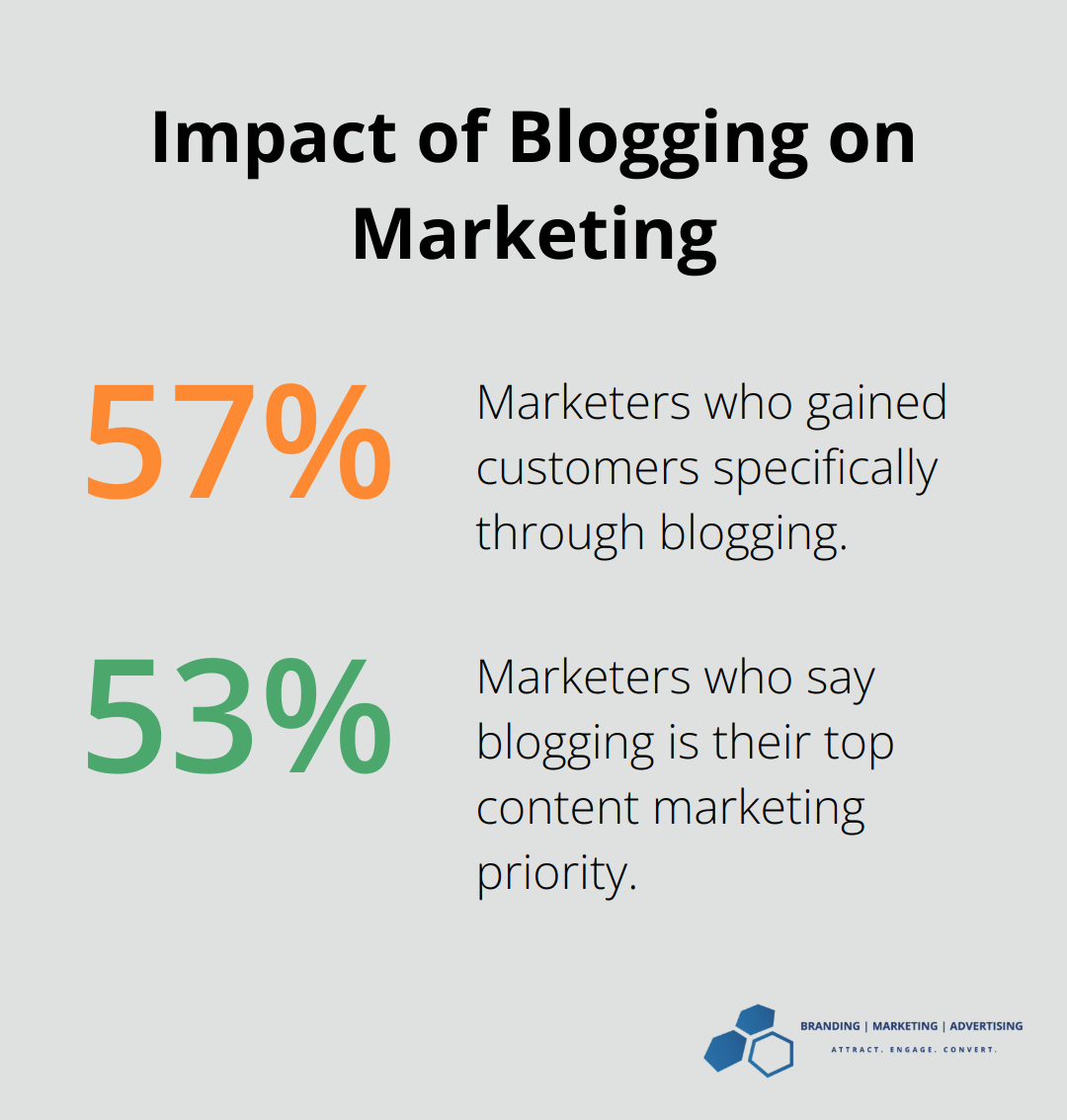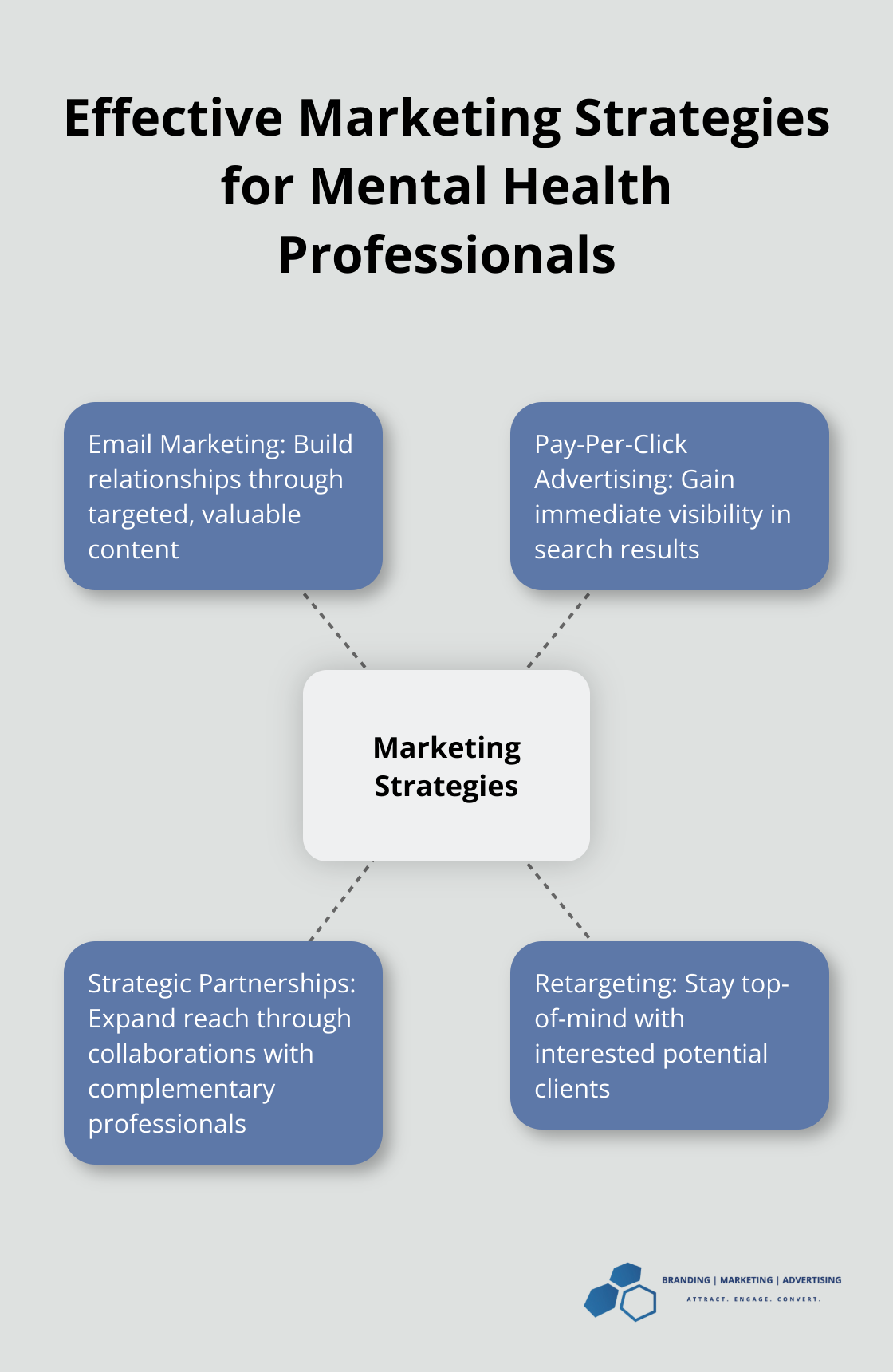How to Market Your Mental Health Practice Effectively
At Branding | Marketing | Advertising, we understand the unique challenges mental health professionals face when promoting their practices.
Effective marketing for mental health professionals is essential for reaching those in need of support and growing a successful practice. With the right strategies, you can build trust, showcase your expertise, and attract the right clients.
In this post, we’ll explore practical ways to market your mental health practice and make a meaningful impact in your community.
Building Your Digital Footprint
In today’s digital age, a strong online presence is essential for mental health practices. Your digital footprint serves as the first point of contact for potential clients, making it imperative to create a professional and engaging online persona.
Craft Your Digital Home
Your website forms the cornerstone of your online presence. It should be more than just a digital business card; it’s a reflection of your practice’s values and expertise. Focus on clear, concise messaging that communicates your services and unique approach. Include a user-friendly appointment booking system to convert visitors into clients effortlessly.
A study by the National Institute of Mental Health reveals that 1 in 5 U.S. adults lives with a mental illness. Your website should speak directly to these individuals, offering hope and guidance. Add a FAQ section addressing common concerns and misconceptions about therapy to alleviate potential anxieties.

Climb the Local Search Ladder
Local SEO is your ticket to visibility in your community. To capitalize on this, ensure your practice’s name, address, and phone number are consistent across all online platforms. Claim and optimize your Google Business Profile, as it’s often the first thing potential clients see in local search results.
Incorporate location-specific keywords naturally throughout your website content. For example, if you’re based in Chicago, use phrases like “anxiety therapist in Chicago” or “depression counseling Chicago” in your page titles and content.
Engage on Social Platforms
Social media isn’t just for cat videos and food pictures. It’s a powerful tool for mental health professionals to connect with their community and showcase expertise. The key is consistency and value. Share mental health tips, research findings, and inspirational content regularly.
A survey by the American Psychological Association found that 90% of adults aged 18-29 use social media. This presents a golden opportunity to reach younger demographics who might be hesitant to seek traditional therapy.
Harness the Power of Patient Feedback
Online reviews can make or break your practice’s reputation. Encourage satisfied clients to leave reviews on Google, Yelp, or healthcare-specific platforms like Healthgrades.
However, tread carefully with patient confidentiality. Never disclose client information or respond to reviews in a way that confirms a person was your patient. Instead, focus on thanking reviewers for their feedback and addressing general concerns professionally.
Your online presence is an ever-evolving entity. Update your website content regularly, stay active on social media, and monitor your online reputation. These actions will create a digital ecosystem that attracts and retains clients, ultimately growing your mental health practice.
As you build your digital footprint, it’s equally important to establish your expertise and build trust with potential clients. Let’s explore how you can showcase your knowledge and create meaningful connections in the next section.
Showcase Your Expertise and Build Trust
Create Compelling Content
Demonstrating your expertise is essential for attracting and retaining clients in the mental health field. One of the most effective ways to do this is through content creation. Start a blog on your website where you share insights on mental health topics relevant to your practice. 57% of marketers say they’ve gained customers specifically through blogging, and 53% of marketers say blogging is their top content marketing priority.

Focus on addressing common concerns and questions your potential clients might have. Write about topics like “Strategies for Managing Anxiety” or “The Link Between Depression and Sleep.” Use simple language and avoid jargon to make your content accessible to a wider audience.
Video content is another powerful tool. Start a YouTube channel where you discuss mental health topics or offer quick tips for emotional well-being. This approach not only showcases your expertise but also helps potential clients feel more comfortable with you before they even step into your office.
Offer Value Beyond the Office
Provide free resources or workshops to demonstrate your commitment to mental health and attract potential clients. Host monthly webinars on topics like stress management or improving relationships. These events allow you to showcase your expertise while providing value to your community.
Create downloadable resources such as e-books or worksheets. A “Mindfulness Meditation Guide” or a “Self-Care Checklist” can be valuable tools for potential clients while also serving as lead magnets for your practice.
Engage with Your Community
Participate in community events and speaking engagements to boost your visibility and credibility. Look for opportunities to speak at local schools, businesses, or community centers about mental health topics. This approach not only positions you as an expert but also allows you to connect with potential clients face-to-face.
Partner with local organizations for mental health awareness events. Team up with a local gym to offer a workshop on the connection between physical exercise and mental health. These collaborations can expand your reach and demonstrate your commitment to community well-being.
Leverage Client Success Stories
While maintaining client confidentiality is paramount, showcase anonymized success stories as a powerful trust-building tool. With client permission, share how your services have positively impacted their lives. These testimonials provide social proof and help potential clients envision the benefits of working with you.
When presenting success stories, focus on the transformation rather than specific details. You might share how a client went from struggling with daily tasks due to depression to regaining their zest for life and pursuing new career opportunities.
Implementing these strategies will not only showcase your expertise but also build trust with potential clients. The goal is to position yourself as a knowledgeable, approachable professional who can provide real help to those in need.
Now that you’ve established your expertise and built trust with potential clients, it’s time to explore targeted marketing strategies that will help you reach the right audience and grow your practice effectively.
Targeted Marketing Strategies That Work

Email Marketing: Your Direct Line to Potential Clients
Email marketing proves to be one of the most effective ways to nurture relationships with potential and existing clients. Start building your mailing list through your website. Offer valuable content like mental health tips or resources in exchange for email addresses.
Segment your email list based on factors like client interests or therapy needs. This allows you to send targeted, relevant content that resonates with each group. You might send information about stress management techniques to one segment and relationship advice to another.
Keep your emails concise, valuable, and action-oriented. Include a clear call-to-action, such as scheduling a consultation or downloading a free resource. Crafting effective email campaigns can help you manage your email marketing efforts successfully.
Pay-Per-Click Advertising: Immediate Visibility for Your Practice
Pay-per-click (PPC) advertising, particularly through platforms like Google Ads, can provide immediate visibility for your mental health practice. PPC allows you to appear at the top of search results for relevant keywords, such as “therapist near me” or “anxiety counseling.”
Identify keywords potential clients might use when searching for mental health services. Use tools like Google’s Keyword Planner to find high-volume, low-competition keywords. Create ads that speak directly to the searcher’s needs and include a compelling call-to-action.
Set a daily budget and monitor your campaigns closely. Adjust your bids and ad copy based on performance to maximize your return on investment. Many mental health practices find success by focusing on local SEO and using ad extensions to display their phone number or location.
Strategic Partnerships: Expanding Your Reach
Form partnerships with complementary health professionals to significantly expand your reach and credibility. Consider collaborating with primary care physicians, nutritionists, or yoga instructors. These professionals often encounter clients who could benefit from mental health services.
Provide guest blog posts for their websites or co-host webinars on topics that bridge your areas of expertise. For example, you could partner with a nutritionist to discuss the relationship between diet and mental health.
These partnerships not only provide exposure to new potential clients but also allow you to offer more comprehensive care to your existing clients. It enhances your reputation as a holistic mental health provider.
Retargeting: Staying Top-of-Mind
Retargeting ads are a powerful tool to stay connected with potential clients who have shown interest in your services. These ads appear to users who have previously visited your website as they browse other sites or social media platforms.
To implement retargeting, install a pixel on your website that tracks visitor behavior. Then, create ads that speak to the specific pages or services they viewed. If someone visited your page about depression therapy, you could show them an ad offering a free guide on managing depression symptoms.
Retargeting keeps your practice in front of potential clients during their decision-making process. It’s particularly effective in the mental health field, where people often research their options extensively before reaching out for help.
Final Thoughts
Marketing for mental health professionals requires a multifaceted approach that combines digital presence, trust-building, and targeted strategies. We at Branding | Marketing | Advertising| Marketing | Advertising understand the unique challenges in promoting mental health services. Our team dedicates itself to helping professionals develop effective marketing strategies that align with their practice’s goals and values.
The mental health landscape and marketing trends constantly evolve, necessitating continuous evaluation and adaptation of your marketing strategies. Regular review of your marketing efforts, analysis of results, and willingness to adjust your approach based on data are essential. This process ensures that your marketing remains effective and relevant in a changing environment.
Effective marketing not only grows your practice but also makes your services known to those who can benefit from them. Implementing these strategies and refining your approach builds a successful practice and makes a meaningful impact on your community’s mental health. Your marketing efforts connect those in need with the support they deserve, fulfilling both professional and ethical responsibilities.












